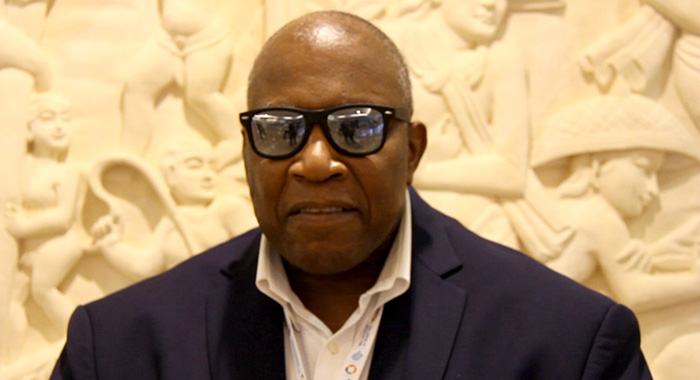By Kenton X. Chance
BALI, Indonesia (CMC) — A visually-impaired Caribbean diplomat says the region needs to provide for people with disabilities in disaster risk reduction planning, and life in general.
“Clearly, whenever we are making arrangements that is related to disaster risk, we must put in place methods and measures to ensure that persons with disability and their needs are responded to,” Dr. Walton A Webson, Antigua and Barbuda’s ambassador to the United Nations.
Speaking with the Caribbean Media Corporation (CMC) on the side-lines of the seventh session of the Global Platform for Disaster Risk Reduction, taking place here, Webson said that Caribbean countries need to ensure that the physical structures are there to allow persons with disability access in and out of facilities, including public buildings.
“We need to make sure that there are opportunities that if somebody has a hearing impairment, that they can get the message that there’s a pending disaster just as anybody else can.
“We need to be sure that the facilities are available to provide information — whether it is through the spoken word or through text or through using sign language — so persons who have varying disabilities can get the same information and preferably at the same time as others who do not have a disability.”
The Antigua and Barbuda diplomat said that people should not see providing for the needs of disabled as an additional cost or burden, noting that Caribbean countries have signed on to international instruments protecting the rights of persons with disabilities.
“So we really have no excuse,” Webson said, adding that cost should not be a factor.
“Our building codes should be redesigned so that from the onset, we are able to build the appropriate needs that persons with disability have to have.
“Every public facility should not only have ramps, they should have accommodating bathrooms … they should have access that persons with disabilities can easily use. So, at times, there might be cost implications. But if the policy and the laws that protect persons with disability are implemented, then that should not be an issue.”
He said that the international conventions call for “reasonable accommodation”, adding, “so it isn’t that we are asking you to break down a whole building and construct something new.
“It is for reasonable accommodation. It is clear that if you’re building something, you must ensure that you have the access for the person with disabilities included in your building plans, whether it’s a home or a public facility, churches, etc.”
Webson said that providing that the cost is not “astronomical”, there is no reason why old buildings should not be retrofitted.
“In all the Caribbean islands, we need to make our streets safer. And this isn’t just for persons with disabilities. If you do that safer, it also accommodates children, it accommodates older people — and we in the Caribbean have an older society — and it also accommodates pregnant women and those who have special needs within that.”
Webson, who has been blind from childhood, is an institutional development consultant, who has lectured at universities in the United States and Africa.
He said the Caribbean has come a long way since his days growing up as a visually-impaired child, who went on to attend university in Jamaica.
“And clearly we have a long way to go. I think it’s safe to say all Caribbean Islands, infrastructure to accommodate persons with disabilities and a range of disabilities needs tremendous enhancement, and that goes from education, right through to employment,” he told CMC.
Webson said much progess has been made over the last 25 years, with people with disabilities attending university, especially in Jamaica, and across the region, people with disabilities hold prominent positions.
“Antigua and Barbuda, where they showed the clear example that we have no barriers inhibiting person with disability if they have the capacity, as I am appointed as the highest ambassadorial office,” he said, adding that there is also a visually impaired person “very high within the Attorney General’s office”.
He noted there have been visually-impaired senators in Barbados and Jamaica and a person who uses a wheelchair was a lawmaker in Trinidad some years ago.
“The question is, ‘Are we utilising those opportunities so that families will know that their children can aspire, based on seeing other persons?’” Webson told CMC.
“I can tell you that since Antigua and Barbuda’s appointment of its ambassador to the United Nations as a visually impaired person being the very first person with visual impairment to be at the UN in this position, we have seen many persons with disabilities including, I would say two or three diplomats, one other ambassador who has subsequently been appointed, and has followed Antigua and Barbuda, in providing opportunities for persons who are blind and persons with other disabilities.”
Webson, however, said that his focus at the conference is not necessarily or exclusively on disability.
“I am representing in this case, not only Antigua and Barbuda, but the Alliance for Small Island States, focusing on all of the vulnerabilities relating to the Alliance of Small Island States that hinder our development.”
Webson said that small island states are the most vulnerable to disaster in the world.
“And the emphasis here for me is helping the international community to respond to the needs of the Alliance of Small Island States in that it is about building facilities, supporting facilitating with persons with disability, but I am not focusing exclusively on disability.
On Friday, Webson will participate in a panel discussion on “Transformative Financing Options to Build Resilience”.
Among other things, the panel hopes to identify barriers to, and opportunities for, developing and implementing transformative disaster risk reduction financing and share examples of transformative financing options that demonstrably reduce risk and build resilience.






